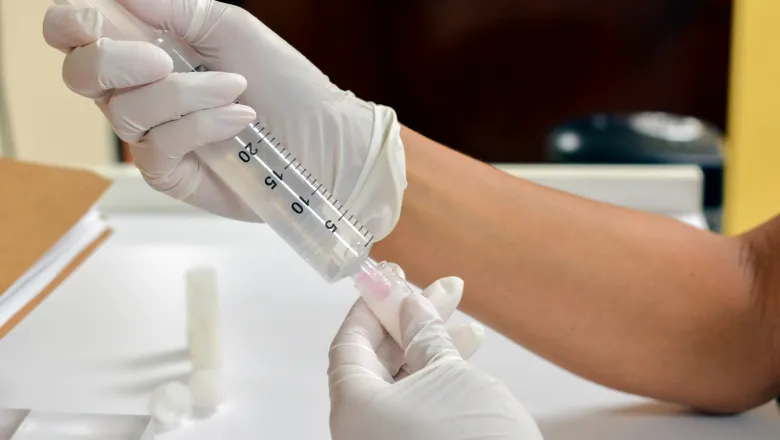These findings advance MSC transplantation as a safe and effective therapeutic for treating those critically ill patients with COVID-19. Our findings show that MSC therapy has multiple modes of action in how it can effectively treat COVID-19."
Professor Georgina Ellison-Hughes
26 October 2021
Novel stem cell therapy approach proves effective in treating COVID-19
An international team of researchers has advanced a new therapeutic approach using stem cells to treat COVID-19.

Despite many advances in treating the COVID-19 virus there remains no specific cure for patients with infection. This is especially the case with hospitalised patients who end up in the ICU requiring mechanical ventilation support.
Key members of UNESCO’s International Society on Aging and Disease (ISOAD) including Georgina Ellison-Hughes, Professor of Regenerative Muscle Physiology at King’s, have found that Mesenchymal stem cells (MSC) are effective at modulating multiple mechanisms and can restore the immune system homeostasis in COVID-19 patients.
MSCs have unique and powerful immunomodulatory characteristics, which make them an excellent candidate cell type for treating COVID-19.
In February 2020 the international team showed that injection of MSCs into seven COVID19-pneumonia patients improved symptoms and recovery time, compared to three placebo-treated patients.
Now the researchers have advanced these findings showing that MSCs are effective at modulating multiple mechanisms and can restore the immune system homeostasis in COVID-19 patients.
In their latest study, published today by Cell Research, the team completed a randomized, single-blind, placebo-controlled Phase II clinical trial of infusion of MSCs. The results of the clinical study demonstrated a significant efficacy of the MSC treatment, whereby MSC infusion rapidly and significantly improved the prognosis of severe and critically ill patients, and alleviated symptoms. Follow-up chest imaging showed a greater improvement in patients with severe or critical disease in the MSC treatment group compared with the placebo group. Significantly, the treatment was also associated with a shorter hospital stay (11 days vs. 15 days).
MSC treatment improved characteristic markers of the disease with treated patients showing decreased levels of C reactive protein, and pro-inflammatory factors and cytokines. The MSC treatment resulted in a prolonged persistence of COVID-19 antibodies. MSC infusion also reduced the incidence of thrombosis shown by a decrease in plasma neutrophil extracellular traps or “NETs”.
Overall, the patients in the MSC treatment group had good tolerance and were discharged from hospital without any adverse reactions. The death rate was zero in the MSC group and 6.9 percent in the placebo group. In line with previous clinical studies, the findings indicate MSCs as a safe therapeutic approach for use in humans and effective in treating COVID-19.
Read the full paper Treatment Improves Outcome of COVID-19 Patients via Multiple Immunomodulatory Mechanisms in Cell Research.
The international team involved in this study, led by Professor Robert Zhao, included key members of the International Society on Aging and Disease (ISOAD) including experts from China, the United States, United Kingdom, France, Italy, Russia, Spain, Israel, South Korea, and other countries, involving more than 20 biomedical laboratories and research organizations. This study helps strengthen interdisciplinary international collaborative innovation and promotes the development of science and technology globally.

